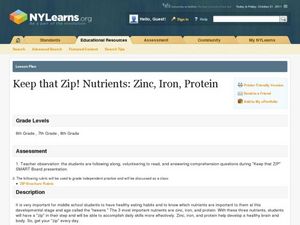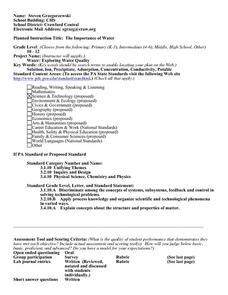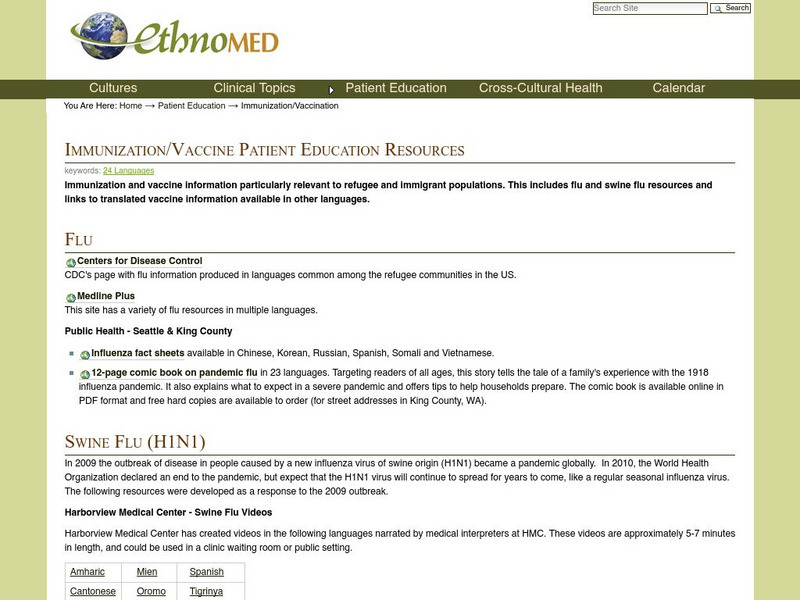Curated OER
My Habitat Address
Sixth graders draw a habitat and write about what they would need to survive in the habitat. They define the input of items such as materials, energy, and information, and what goes out of the habitat. They play a "Habitat Address" game,...
Curated OER
Make a TV Commercial for "Brighty-Whitey" Toothpaste
Students develop the skill of creativity by creating their own brand of toothpaste. The class will present the different projects in front of the class in the form of a speech.
Curated OER
Effects of Alcohol Use
Fifth graders identify short and long term effects of alcohol use. For this effects of alcohol lesson plan, 5th graders participate in activities to understand what it feels like to have alcohol in their system. With the teacher they...
Curated OER
High Tech Food
Young scholars view videos, read, and fill in charts about agriculture production. In this agriculture lesson plan, students complete these agriculture activities and explore careers in agriculture.
Curated OER
Dark Days
Fifth graders explore U.S. history by viewing video clips in class. In this dust bowl era activity, 5th graders identify the impact of giant dust storms on the U.S. agriculture systems and the U.S. economy in the 20th century. Students...
Curated OER
Tree-mendous!
Sixth graders discover an appreciation for the benefits of trees. In this tree activity, 6th graders explore the benefits of trees by playing a word classification game. Students study the variety of uses for trees.
Curated OER
Keep that Zip! Nutrients: Zinc, Iron, Protein
Students explain the importance of zinc, iron and protein. In this biology lesson, students create a brochure containing information about the three nutrients. They share their brochure in class.
Curated OER
Skills You Need to Succeed
Middle schoolers identify basic skills needed to succeed in the world of work, including communication skills, computation skills, problem solving skills, and interpersonal skills.
Curated OER
Pesticide Prevalence
Students investigate the prevalence of pesticides in their communities by
searching their homes, visiting local stores and talking to extended family and friends. They conduct their search by classifying pesticides based on the pests...
Curated OER
Food Travels and Preservation
Fourth graders study food processing and distribution. In this food processing instructional activity, 4th graders investigate various methods of food preservation. Students study methods of food distribution.
Curated OER
Costs & Benefits
Students reinforce the concept of the true costs being what is given up by doing something -- normally referred to as opportunity costs.
Curated OER
Dissolved Oxygen
Students discuss the relationships between dissolved oxygen in a stream, stream temperature, organic waste loads, and stream conditions by studying and using a model of dissolved oxygen in the stream.
Curated OER
The Importance of Water
Students explore the importance of water. They discuss why water is important and students design an experiment that evaluates the water quality and methods of improving water quality. Students perform testing and report their findings.
Other
Ethno Med: Immunization/vaccine Information Statements
Use this site to access more than 200 health education brochures in a wide variety of languages. Many of the brochures are downloadable PDF files but some information is also available as sound or video recordings.
Federal Trade Commission
Federal Trade Commission: Consumer Information
The Federal Trade Commission has developed helpful investment articles and videos to assist consumers in making educated decisions about how they spend, manage and invest their money.
Other
Fisher Science Education: Headline Discoveries Archive
What's new in the world of science? Find the latest articles about the newest discoveries and research in all the science disciplines: anatomy, astronomy, biology, biotechnology, chemistry, consumer science, environmental, forensics,...
Science Education Resource Center at Carleton College
Serc: Using "Good Guide" to Create Better Consumers
This learning activity helps educators and students use a valuable web resource that ranks products based on three sustainability criteria: personal health, environmental impact, and social equity.
Council for Economic Education
Econ Ed Link: Break a Leg
In this lesson, students will learn about the basic components and terminology of individual health insurance. Students will make decisions about the value of insurance protection and you will identify trends in the cost of medical care...
Other
Mother and Child Health and Education Trust: Stages in the Life of a Child
Everything you need to know about pregnancy to early childhood development is simply a click away. A wealth of resources for family and consumer science teachers, new mothers and for students looking for answers.
Council for Economic Education
Econ Ed Link: What Does a Dollar Really Buy?
Learners will describe the purpose of a price index, and how it is calculated. Then students will describe the weaknesses of the CPI, and interpret CPI data as a measure of economic health. Finally, learners will identify who is harmed...


















